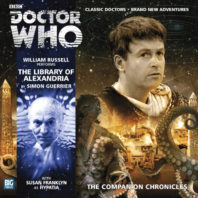
Released April 2013
Taking a break from their travels while in the port of Alexandria in the fifth century to bask in the sun and enjoy the splendours of the glorious Library, the Doctor, Susan, Ian, and Barbara soon find themselves in the middle of one of history’s greatest mysteries as the vast repository’s known loss quickly approaches in Simon Guerrier’s ‘The Library of Alexandria.’
The story begins as so many classic historicals of the Hartnell era have, developing at a fairly leisurely place as Alexandria, its culture, and its occupants come to the forefront. In many ways, the Library of Alexandria represents the Earth’s first real research institute, the accumulation of knowledge here forming the foundation for so many of humanity’s future forays both on the planet and beyond, and this is a time when philosophers are still trying to determine how to understand and quantify the vastness of size and details around them as well as Earth’s very position and importance relative to other celestial bodies. Naturally, just as Barbara Is delighted to have the opportunity to read some of the written works of the time, Ian can’t help but find himself drawn to the display of expanding scientific intellect. Ever careful not to reveal any information from his own time, Ian forms a natural chemistry with philosopher and teacher Hypatia who is just as keen to discuss the ideas that have- rightly or wrongly- pervaded the thinking of the time, and this relationship with hints of romantic undertones works exceedingly well when paired with the obvious affection between Ian and Barbara that as of yet has remained unspoken. Still, Barbara’s believable irritation and Ian’s somewhat muted explanations to both Hypatia and Barbara about where he finds himself helps to develop this first TARDIS couple incredibly effectively.
Yet halfway through its running time, ‘The Library of Alexandria’ takes a most unexpected turn away from its pure historical progression as sea monsters that were on Susan’s researched list of possible reasons for the Library’s fall mount an all-out attack. What follows in the second episode is a race against time as the invading Mim, an alien species that gained such prominence in the Bernice Summerfield range, pursue without any sense of remorse a missing book containing vital reconnaissance information that could wholly change humanity’s development should its contents enter the public consciousness. With Hypatia coming to terms with the universe being far larger than she could ever have conceived and with the Doctor and his companions insistent that history runs its proper course while Susan reminds everyone that they don’t actually know the exact circumstances behind this particular moment, the vast displays of emotions and the continued determination to save what they can are always utterly believable and ensure a very human element remains throughout this more monster-laden pseudo-historical portion.
Had Guerrier revealed the science fiction elements of this story early on as most are wont to do, ‘The Library of Alexandria’ would have succeeded with spectacle but lost so much of the genuine heart and emotion at its core. With sterling direction and sound design accompanying William Russell’s always-profound performance as Ian and an understated but powerful outing from Susan Franklyn who likewise proves adept at narrating when given the chance, every aspect of the story comes together nicely to provide a wholly engrossing experience that deftly combines the storytelling norms of so many different eras of Doctor Who. The Mim may not have been the most well-defined villains despite their importance in the spin-off media, but the visuals and power attributed to them here as well as the Doctor’s own cunning and verbal prowess to emerge victorious end the story on a high and complement the very personal journey of Ian to great effect.
- Release Date: 4/2013


Leave a Reply